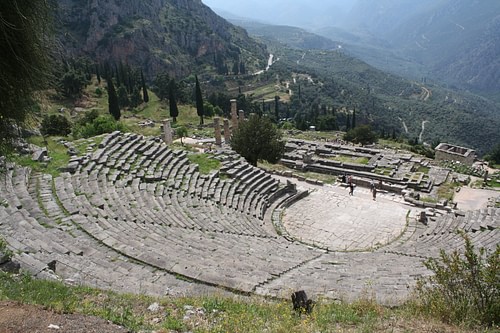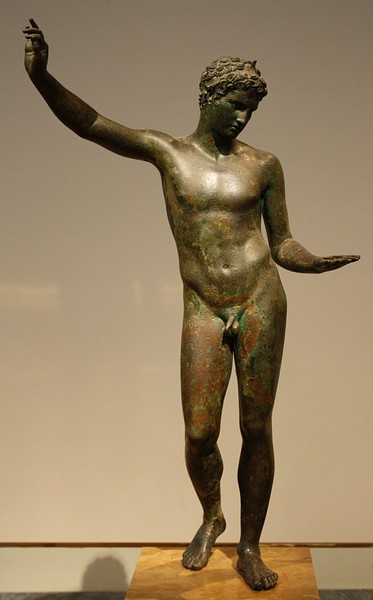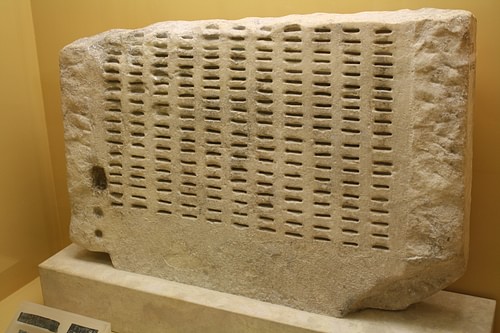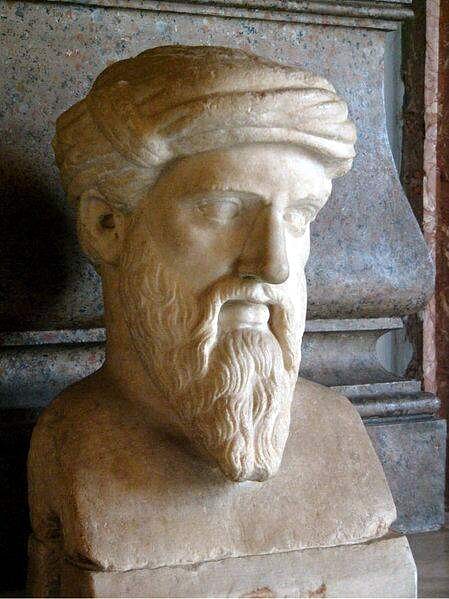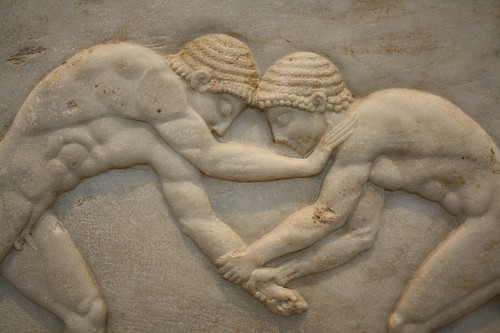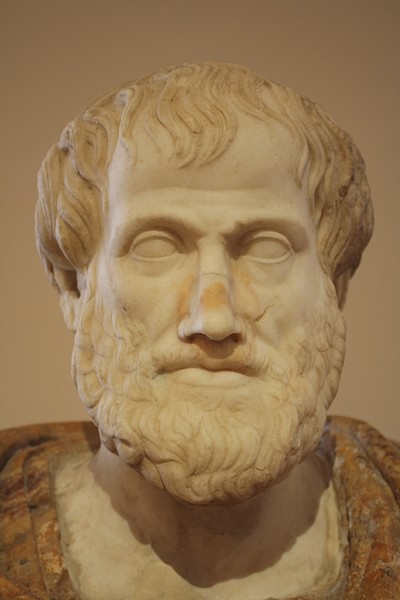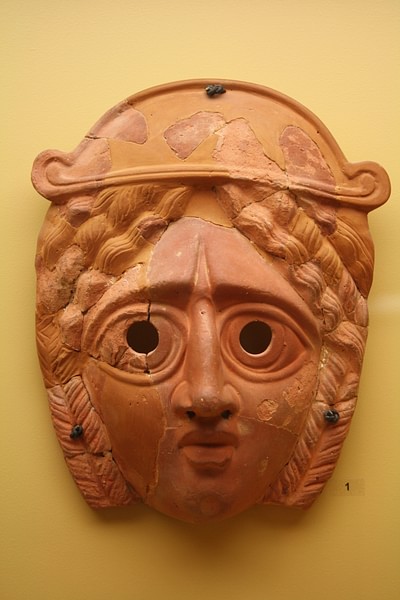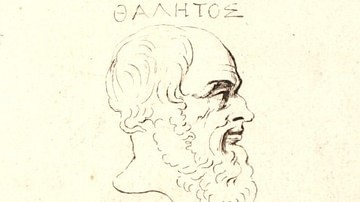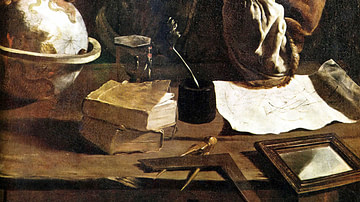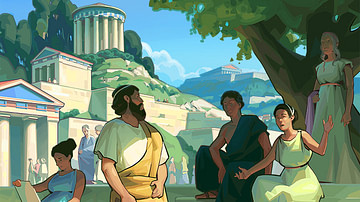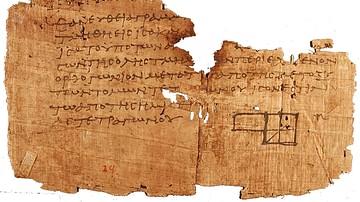The ancient Greeks are often credited with building the foundations upon which all western cultures are built, and this impressive accolade stems from their innovative contributions to a wide range of human activities, from sports to medicine, architecture to democracy.
Like any other culture before or since, the Greeks learnt from the past, adapted good ideas they came across when they met other cultures, and developed their own brand new ideas. Here are just some of the ways ancient Greeks inventions have uniquely contributed to world culture, many of which are still going strong today:
- Columns
- Stadiums
- Human Sculpture
- Democracy
- Jury System
- Mechanical Devices
- Mathematical Reasoning
- Geometry
- Medicine
- Olympic Games
- Philosophy
- Astronomy
- Science
- Theatre
Columns & Stadiums
Just about any city in the western world today has examples of Greek architecture on its streets, especially in its biggest and most important public buildings. Perhaps the most common features invented by the Greeks still around today are the Doric, Ionic, and Corinthian columns which hold up roofs and adorn facades in theatres, courthouses, and government buildings across the globe. The Greeks used these architectural orders primarily for their temples, many of which are still standing today despite earthquake, fire, and cannon shots - the Parthenon, completed in 432 BCE, is the biggest and most famous example. The collonaded stoa to protect walkers from the elements, the gymnasium with baths and training fields, the semi-circular theatre with rising rows of seats, and the banked rectangular stadium for sports, are just some of the features of Greek architecture that any modern city would seem strange indeed without.
HUman Sculpture in Art
Greek innovations in art are perhaps seen most clearly in figure sculpture. Previous and contemporary ancient cultures had represented the human figure in a simple standing and rather static pose so that the people represented often looked as lifeless as the stone from which they were carved. Greek sculptors, though, inched towards a more dynamic result. In the Archaic period the stance becomes a little more relaxed, the elbows a little more bent and both tension and movement are thus suggested. By the Classical period statues have broken away from all convention and become sensuous, writhing figures that seem about to jump off the plinth. Greek sculpture and art, in general, began a preoccupation with proportion, poise, and the idealised perfection of the human body that was continued by the Romans and would go on to influence Renaissance art and many sculptors thereafter.
Democracy & Jury System in Law
One of the big ideas of the Greeks was that ordinary citizens should have an equal say in not just who governed them but also how they governed. Even more importantly, that input was to be direct and in person. Consequently, in some Greek city-states, 5th-4th-century BCE Athens being the most famous example, citizens (defined then as free males over 18) could actively participate in government by attending the public assembly to speak, listen, and vote on issues of the day. The Athenian assembly had a physical capacity of 6,000 people, and one can imagine that on many days only the most enthusiastic of the demos (people) would have turned up but when the big issues were on the table the place was packed. A simple majority vote won the day and was calculated by a show of hands.
On top of this already startling idea of direct democracy, all citizens could, and indeed were expected to, participate in government by serving as magistrates, jurors, and any official post they were capable of holding. Further, anyone seen to abuse their public position, which was usually only for a temporary term anyway, could be kicked out of the city in the secret vote known as ostracism.
Part and parcel of the democratic apparatus was the jury system - the idea that those accused of crimes were judged by their peers. Nowadays a jury system usually consists of twelve people but in ancient Athens, it was the entire assembly and each member was picked at random using a machine known as the kleroterion. This device randomly dispensed tokens and if you got a black one then you had to do jury service that day. The system made sure that nobody knew who would be the jurors that day and so could not bribe anyone to influence their decision. In a carefully considered system that thought of everything, jurors were even compensated their expenses.
Engineering & Mechanical devices
The Romans might have grabbed all the accolades for best ancient engineers but the Greeks did have their own mechanical devices which allowed them to move massive chunks of marble using the block and tackle, winch, and crane for their huge temples and city walls. They created tunnels in mountains such as the one-kilometre tunnel in Samos, built in the 6th century BCE. Aqueducts was another area the Greeks were not lacking in imagination and design, and so they shifted water to where it was most needed; watermills, too, were used to harness nature's power.
Perhaps the area of greatest innovation, though, was in the small-scale production of mechanical devices. The legendary figure of Daedalus, architect of King Minos' labyrinth, was credited with creating life-like automata and all manner of mechanical wonders. Daedalus may never have existed, but the legends around him indicate a Greek love of all-things magically mechanical. Handy Greek devices included the portable sundial of Parmenion made from rings (c. 400-330 BCE), the water alarm clock credited to Plato (c. 428- c. 424 BCE) which used water dropping through various clay vessels which eventually caused air pressure to sound off a whistle-hole, Timosthenes' 3rd-century BCE anemoscope to measure the wind direction, and the 3rd-century BCE hydraulic organ of Ktesibios. Then there was the odometer which measured land distances using a wheel and cogs, the suspended battering ram to provide more punch when breaking down enemy gates, and the flamethrower with a bellows at one end and a cauldron of flammable liquid at the other which the Boeotians used to such good effect in the Peloponnesian War.
Mathematical Reasoning & Geometry
Other cultures had shown a keen interest in mathematics but perhaps the Greeks' unique contribution to the field was the effort to apply the subject to practical and everyday problems. Indeed, for the Greeks, the subject of maths was inseparable from philosophy, geometry, astronomy, and science in general. The great achievement in the field was the emphasis on deductive reasoning, that is forming a logically certain conclusion based on the reasoning of a chain of statements. Thales of Miletus, for example, crunched his numbers to accurately predict the solar eclipse of May 28, 585 BCE, and he is credited with calculating the height of the pyramids based on the length of their shadow. Undoubtedly, the most famous Greek mathematician is Pythagoras (c. 571- c. 497 BCE) with his geometric theorem which still carries his name - that in a right triangle the square of the hypotenuse is equal to the squares of the short sides added together.
Medicine
The early Greeks considered illness a divine punishment, but from the 5th century BCE a more scientific approach was taken, and both diagnosis and cure became a lot more useful to the patient. Symptoms and cures were carefully observed, tested, and recorded. Diet, lifestyle, and constitution were all recognised as contributing factors to disease. Treatises were written, most famously by the 5th-4th-century BCE founder of western medicine Hippocrates. A better understanding of the human body was achieved. Observation of badly wounded soldiers showed, for example, the differences between arteries and veins, although dissection of humans would only come in Hellenistic times. Medicines were perfected using herbs; celery was known to have anti-inflammatory properties, egg-white was good for sealing wounds, while opium could provide pain relief or work as an anaesthetic. While it is true that surgery was avoided and there were still many wacky explanations floating about, not to mention a still strong connection to religion, Greek doctors had begun the long road of medical enquiry which is still being pursued to this day.
Olympic Games
Sporting competitions had already been seen in the Minoan and Mycenaean civilisations of the Bronze Age Aegean, but it was in Archaic Greece that a sporting event would be born which became so popular and so important that it was even used as a reference for the calendar. The first Olympic Games were held in mid-July in 776 BCE at Olympia in honour of the Greek god Zeus. Every four years, thereafter, athletes and spectators gathered from across the Greek world to perform great sporting deeds and win favour with the gods. The last ancient Olympics would be in 393 CE, after an incredible run of 293 consecutive Olympiads.
There was a widely respected truce in all conflicts to allow participants and spectators to travel in safety to Olympia. At first, there was only one event, the stadion - a foot race of one circuit of the stadium (about 192 m) in which some 45,000 all-male spectators gathered to cheer on their favourite. The event got bigger and bigger over the years with longer footraces added to the repertoire and new events held such as the discus, boxing, pentathlon, wrestling, chariot racing, and even competitions for trumpeters and heralds.
Specially trained judges supervised the events and dished out fines to anyone breaking the rules. The winners received a crown of olive leaves, instant glory, perhaps some cash put up by their hometown, and even immortality, especially for the winners of the stadion whose name was given to that particular games. The Olympic Games were revived in 1896 CE and, of course, are still going strong, even if they have another thousand years to go to match the longevity of their ancient version.
Philosophy
The great Greek thinkers attacked all of the questions that have ever puzzled humanity. Figures such as Socrates, Plato, and Aristotle in the 5th and 4th century BCE endlessly questioned and debated where we come from, how we have developed, where we are going to, and should we even be bothering to think about it all in the first place. The Greeks had a branch of philosophy to suit all tastes from the grin-and-bear-it Stoics to the live for the minute, live simply and live happily Epicureans. In the 6th century BCE, Anaximander provides the first surviving textual reference of western philosophy and he considered that “the boundless” was responsible for the elements - so we have still not made very much progress since that statement.
Collectively, all of these thinkers illustrate one common factor: the Greek's desire to answer all questions no matter their difficulty. Neither were Greek philosophers limited to theoretical answers as many were also physicists, biologists, astronomers, and mathematicians. Perhaps the Greek approach and contribution to philosophy, in general, is best summarised by Parmenides and his belief that as the senses cannot be trusted, we must apply our minds to cut through the haze of superstition and myth and use whatever tools at our disposal to find the answers we are looking for. We may not have found many more solutions since the Greek thinkers provided theirs but their unbounded spirit of enquiry is perhaps their greatest and most lasting contribution to western thought.
Science & Astronomy
As in the field of philosophy, Greek scientists were keen to find solutions which explained the world around them. All manner of theories were proposed, tested and debated, even rejected by many. That the earth was a globe, that the world revolved around the sun and not vice versa, that the Milky Way was composed of stars, that humanity had evolved from other animals were just some of the ideas the Greek thinkers floated around for contemplation. Archimedes (287-212 BCE) in his bath discovered displacement and cried “Eureka!”, Aristotle (384-322 BCE) developed logic and classified the natural world, and Eratosthenes (276-195 BCE) calculated the circumference of the globe from the shadows cast by objects at two different latitudes. Once again, though, it was not the individual discoveries that were important, it was the general belief that all things can be explained by deductive reasoning and the careful examination of available evidence.
Theatre
It was the ancient Athenians who invented theatre performance in the 6th century BCE. Perhaps originating from either the recital of epic poems set to music or rituals involving music, dance and masks to honour the god of wine Dionysos, Greek tragedies were first performed at religious festivals, and from these came the spin-off genre of Greek comedy plays. Performed by professional actors in purpose-built open-air theatres, Greek plays were popular and free. Not only a fleeting pastime performance, many of the classic plays were studied as a staple part of the education curriculum.
In the tragedies, people were engrossed in the twists presented on familiar tales from Greek mythology and the no-win situations for the heroic but doomed characters. The cast might have been very limited but the chorus group added some musical oomph to the proceedings. When comedy came along, there was fun in seeing familiar politicians, philosophers, and foreigners lampooned, and playwrights became ever more ambitious in their presentations, with all-singing, all-dancing chorus lines, outlandish costumes, and special effects such as actors dangling from hidden wires above the beautifully crafted sets. As in many other fields, the entertainment industry of today owes a great debt to the ancient Greeks.
